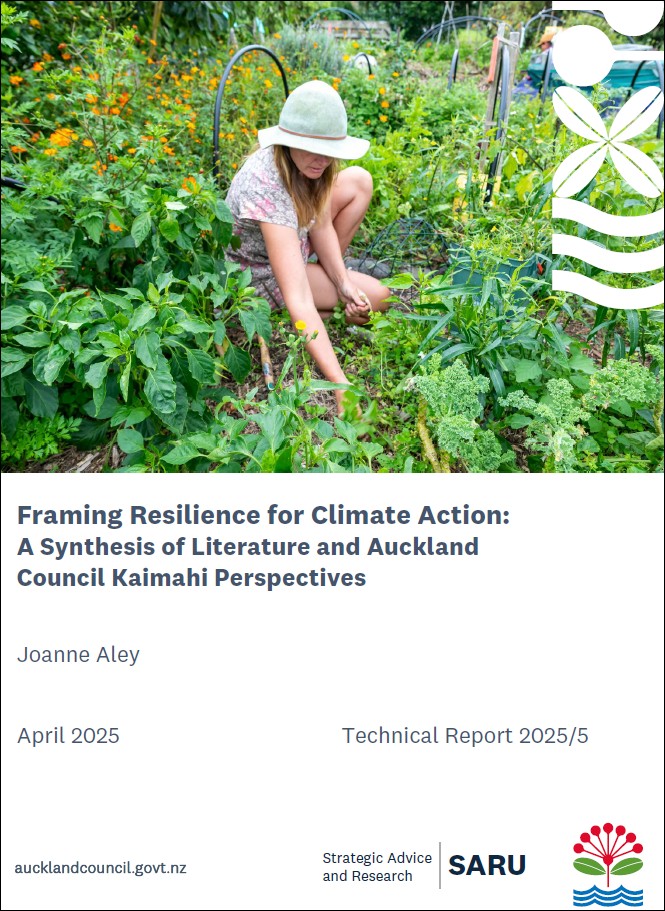Framing resilience for climate action: synthesis of literature Auckland Council kaimahi perspectives
Author:
Joanne AleySource:
Auckland Council Strategic Advice and Research UnitPublication date:
2025Topics:
People ,EnvironmentExtracts from the Executive summary
Introduction
Following the declaration of a climate emergency in 2019 and the severe weather events experienced in Tāmaki Makaurau/Auckland in 2023, climate action has become a cross-cutting organisational priority for Auckland Council. This priority has resulted in the notion of resilience to climate disruption being applied across various contexts, from community engagement to spatial planning and infrastructure management. While the term ‘resilience’ is referred to in all main strategic framework documents including The Auckland Plan 2050; The Long-term Plan 2024-2034; The Auckland Unitary Plan, Kia ora Tāmaki Makaurau, Ngā Hapori Momoho Thriving Communities Strategy 2022-2032, and Te Tāruke-ā-Tāwhiri: Auckland’s Climate Plan, it is only defined in Te Tāruke-ā-Tāwhiri.
In mid-2024, the Auckland Council’s Chief Sustainability Office and Policy Department, both involved in Auckland Council’s climate action response, commissioned the council’s Social and Economic Research and Evaluation Team to undertake a study with the primary purpose of understanding how the concept of resilience is perceived across the organisation, especially by those working in climate disruption and climate action programmes. This report presents the results of that study.
The study sought to understand how the term ‘resilience’, and to a lesser extent the related concepts of ‘adaptation’ and ‘mitigation’, are understood within the organisation, as while the term is widely used, its application in different contexts may lead to ambiguity and misinterpretation. ...
Findings
While the term ‘resilience’ is consistently underpinned by notions of responding to adversity, it has evolved from a historical meaning of withdrawal to a more recent meaning of adaptability and growth. In parallel with this etymological shift is an expansion in recent decades of the contexts in which the term has been applied, from being mostly associated within an engineering context to more adaptive concepts related to climate disruption and community response. This has led to a broad acknowledgement in the literature that there is no one clear definition of resilience to suit all contexts.
Recognising the cultural contexts of resilience is important. The literature suggests a profound connection between culture and resilience, with cultural values providing meaning and strength to individuals facing adversity. The strong connection between culture and resilience, including the resilience of te ao Māori was identified in the literature review and reflected in the interviews.
The literature also identified several characteristics that underpin notions of resilience related to climate disruption impacts. These included embracing diversity across ecological and economic contexts, alongside social considerations, effective governance that incorporates decentralising processes, community involvement including incorporating local knowledge, recognising the inevitability of uncertainty and change, learning to facilitate adaptation to future conditions, and adopting a perspective that acknowledges the interconnectedness of system components is key at all levels. Resilience is increasingly becoming a central theme in climate disruption policies, acting as a metaphor for adapting or mitigating the impacts of climate change.
Interviews with Auckland Council staff found that participants viewed resilience as not just recovering from setbacks but as a transformative process focused on growth and future-oriented thinking. The concept of resilience was understood as stemming not only from individual capabilities but also collective action and strong relationships. Māori principles such as whanaungatanga and whakapapa were highlighted as ways to draw strength from ancestors while also focusing on future generations. A focus on community outcomes was a common theme across different roles and work programmes.
However, a potential disparity between the term’s use and meaning within relevant plans and policies, compared to use with communities, became apparent. Some participants who had been working with communities in Auckland affected by the 2023 storm events had shifted away from using the term ‘resilience’ in their communication with them. Those participants conveyed a preference for being able to explicitly define desired outcomes that would serve to enable resilience rather than relying on the term ‘resilience’.
Participants had mixed feelings about the idea of Auckland Council developing a single definition of resilience, noting that it might be restrictive and may not be inclusive of different world views. While the current Intergovernmental Panel on Climate Change (IPCC) definition2 covers many themes of participants’ views, it was felt to not adequately address the importance of cultural values, meanings, and indigenous perspectives. ...
_______________________________________
2. The capacity of interconnected social, economic and ecological systems to cope with a hazardous event, trend or disturbance, responding or reorganising in ways that maintain their essential function, identity and structure. Resilience is a positive attribute when it maintains capacity for adaptation, learning and/or transformation (IPCC, 2022, P. 2921)
Auckland Council technical report, TR2025/5
April 2025
